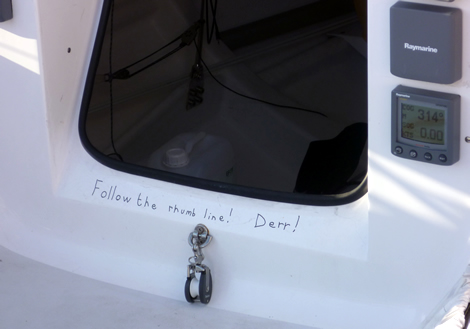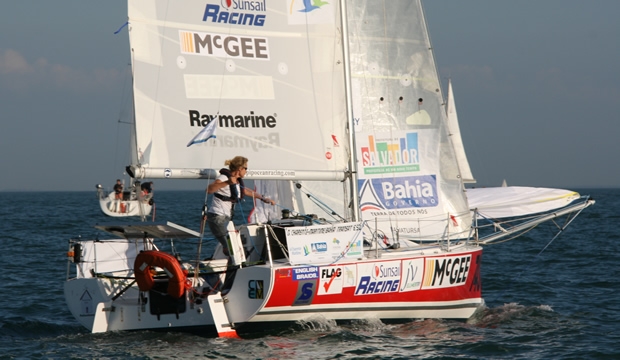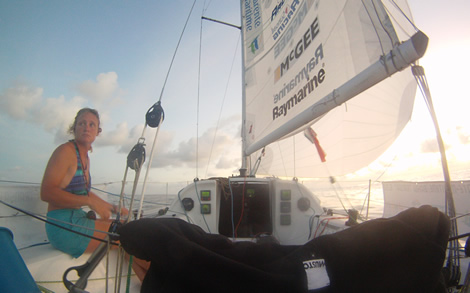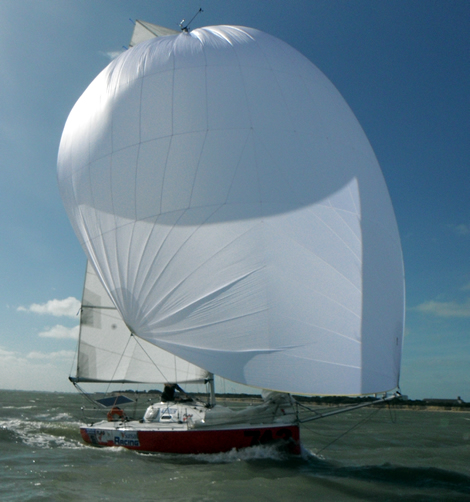Second crack at the Mini Transat
In December, Classe Mini announced that the course for their flagship event, the biennial Mini Transat, is to return to a more ‘traditional’ course, finishing in the Caribbean, when it is next run in 2013. This follows a decade of the singlehanded transatlantic race for the 21ft long Minis running from La Rochelle to Salvador de Bahia, Brazil. Bob Salmon’s first Mini Transat back in 1977 went from Penzance to Antigua, before the French took over the running of the event in 1984 sending it to the French Caribbean.
According to British competitor Pip Hare, who this season embarks on her second Mini campaign, the return to the more ‘classic’ course is causing a further surge of interest in the Mini Transat. (Not that more interest is necessarily needed – for as long as we can remember - and the first Mini Transat we covered was 1995 – the event has always been oversubscribed, with Classe Mini forced to establish a waiting list.)
When she spoke to us, Pip had recently returned from visiting her Pogo 2 near Lorient in France. “It was fantastic. All the Minis that were for sale after the Transat have changed hands already. I have had four emails from people trying to buy my boat, so I think that the next Transat is going to be huge. And all the guys who have sold their boats are still hanging around helping the new guys.” For anyone who’s interested, secondhand tricked-up race-ready Pogo 2s typically change hands for 52-53,000 Euros.
Pip adds: “A lot of people who finished the last race, and said ‘never again’ have said they’d be interested [in the next race]. A lot were saying ‘well, if it going to the Caribbean, then we’ll do it’.”
The 2013 Mini Transat is to run from Douarnanez to Guadeloupe with a stopover, probably in the Canary Islands (it is yet to be announced) with a start date that is expected to be in October, ie slightly later in the season than previous races.
Among the post 2011 Mini Transat yacht brokerage, David Raison’s innovative scow TeamWork Evolution, that demolished the opposition in the Proto class, has been sold to Italian Giancarlo Pedote, who finished fourth in the 2009 Mini Transat. Raison is still involved with the boat helping Pedote optimise her, however it will be interesting to see if any others in the Proto class follow Raison’s example by going down the blunt-bowed route.
This year Pip Hare has joined the Mini training camp based out of the WW2 submarine silos in Lorient where she and her group, including many of the most competitive sailors in the class, will be working with uber-solo offshore coach Tanguy Leglatin.
After this she intends to carry out a full program on the Mini circuit: “I want to do the whole lot, the full calendar. The only one I can’t do, because it clashes with other commitments, is the Pornichet Select.”
The major event of this season for the Minis is the Les Sables-Azores-Les Sables starting on 29 July from the well known Vendee Globe host port of Les Sables d'Olonne. After this Pip says she is going to take her Mini to the Mediterranean as there is a good circuit to end the season with the Grande Huit (25 August) starting and finishing in La Grande Motte in the south of France, followed by the AIR 2012 (29 September), starting from Valencia and going around the Balearics before returning to Valencia. AIR = Around Islands Race. The season concludes with the Mini Barcelona on 29 October.
Having completed the Mini Transat last year, Pip’s qualification requirements to get into the 2013 event are minimal – she only has to do one race each year. However for those not qualified there is an opportunity to sail the mandatory 1000 mile offshore passage either in the Atlantic in September after the Azores race or in the Med after the Mini Barcelona. “So you can get all of that done this year, which if you are thinking strategically about qualifying, is quite an interesting option," says Pip. "That is something you have got to think about, because so many people last year were struggling to get on the list and wouldn’t have got on to the list if they hadn’t opened the numbers up - me included.”
Minis in the UK this year
But the best news for British Mini sailing is that finally there are some races in the official Classe Mini calendar taking place in the UK. While the class already has a well established Mini Fastnet event (10 June) starting and finishing in Douarnanez, this year’s UK Fastnet for the Minis is now formally in the Classe Mini calendar, with a course running from Plymouth to the Fastnet Rock and back to Plymouth. The event is being run by the Royal Western Yacht Club, which having staged the first OSTAR back in 1960 is attempting to re-establish itself as the premier club in the UK for shorthanded long distance offshore racing. The Royal Western is to be congratulated for having revived the TwoSTAR, which they are running this year, starting on 3 June, on the original course from Plymouth to Newport, RI.
The UK Fastnet being included in the official Classe Mini calendar means it can form part of the arduous qualification process for the Mini Transat. As a result at least 60 boats are expected to be on the start line. Significantly, also in the calendar are two feeder races to Plymouth for the start, one from La Trinite-sur-Mer and the other, the UK Solent 6.50, starting from Lymington to Plymouth via Wolfe Rock, both races setting off on 6 May.
“It is pretty important for British Mini sailing because it is the first time we have had a Cat C race in the UK,” says Pip. “The Fastnet is a Cat B race, so in the past if you wanted to do the Fastnet you had to have gone to France and done a Cat C race there or get special dispensation to qualify for the Fastnet. But this year, because we have a Cat C race feeding from Lymington down to Plymouth, you can qualify for the Fastnet without leaving the UK.” Under Classe Mini rules, a Cat C race has legs of no more than 300 miles, while a Cat B race has one or more legs of 300-1000 miles.
The UK Solent 6.50 is being run by British former Mini Transat competitor Keith Willis and will be supported by Fuel Cell Systems and Barton Marine. Dust off your Mini and come play. Competitors also have the opportunity to take part in some training being run by the Artemis Offshore Academy in Cowes during April.
To qualify for the Mini Transat requires competitors to sail 1000 miles in races and to complete another 1000 mile qualification passage. So for British competitors wishing to enter next year’s race, there is now a reasonably straightforward process to get in the mandatory 1000 miles of racing this year with the UK Solent, UK Fastnet followed by the Trophée Marie-Agnès Péron out of Douarnanez on 31 May, which can then be followed by the 1000 mile passage.
British Mini hopes
We hope that a few more Mini sailors from the UK are going to come out of the woodwork. At present Pip Hare seems to be gunning the hardest among the Brit hopes. After not managing to make it into the Mini Transat last year, Becky Scott is being backed by the Artemis Offshore Academy and this year her main event will be the Les Sables-Azores-Les Sables. Becky sails the Artemis Pogo2 Series class Mini which Ollie Bond campaigned in the 2009 Mini Trasnat. But at present it is unclear whether support from the Academy for Scott will continue on through into 2013 and for the Mini Transat itself.
Another British female competitor is on the cusp of getting into the Mini which we’ll report on when it comes to pass.
So three girls – what of the boys? The only one to emerge so far is Luke Dampier who has a Pogo 2. Dampier competed in the Clipper Round the World Race and was the nipper on the Artemis IMOCA 60. He recently announced backing for his Mini campaign from Bristol-based financial services company, Hargreaves Lansdown.

Back to Pip and having finished 17th in a field of 46 starters in the Series class in the Mini Transat last year, her aim now is to be one of the top contenders in next year’s race.
As expected she came out of the Mini Transat with a long list of lessons learned: “Yes, a massive list, the biggest of which is just to sail in a straight line and don’t try and be clever!
“In terms of my boat preparation I was pretty pleased with that. I guess my strategy for last year was always – I’ve got to get to the end and I knew with just one year [in the class] I couldn’t go boat-on-boat with the top guys, because I just don’t have enough knowledge about how to make the boat go fast, but that is what I need to do over the next two years. That is the reason why I want to train with Tanguy [Leglatin] and the really good guys, to do the speed testing and boat on boat stuff and learn how to get that extra 0.1 knot of out of it.
“Having said that, my boat speed improved dramatically in the last half of the race [the Mini Transat]. I learned a lot particularly about where to put the weight on the boat, which wasn’t necessarily what I was taught. It is more about feel and I was able to drive the boat faster downwind after a couple of weeks of messing around.”
Pip says she was for the most part pleased with her sail choices for the race, having worked with the legendary John Parker of Parker & Kay (now associated with OneSails). “I was really happy with my spinnakers because we made spinnakers that were a bit deeper. I couldn’t hold the big kite as high as the other guys, but then I could sail 5° lower than them and in that race that really paid off. In the next race, okay it is on a different route, so I am going to have to think about it, but I can’t see where a medium spinnaker fits into it. Because I was holding my big kite right up to 21-22 knot and then changing down to the medium and I had a gap of about 4-5 knots for the medium and then I was going down to the small one.
“Next time I’ll possibly having two big kites - one which you go mad with and blow up and then have a stand in and then having a slightly bigger small kite and then a bigger code 0 for your chicken chute – for me that would seem a more sensible plan. I was really really happy to go for a Solent and not an overlapper after all the deliberation about that. So we have something to work on with the sail plan, but generally I was very pleased about that.”
In terms of her personal performance in the race she says: “Definitely I need to work on my cardiovascular fitness. Part of that was because on January last year I got knocked off my bike and that put a stop to my cardiovascular training for two months and after that with all the qualifying and driving Europe eating motorway service station food, I fell off a level and never managed to get back onto it. Already I am running and I want to do a half marathon this year and want to work on that side of it to get myself fitter.”
A significant issue for many of the competitors in the last race was the solitude. With modern satcoms there is now no other tran-oceanic singlehanded race other than the Mini Transat that prohibits the use of voice comms beyond VHF. This means that on the second leg from Madeira down to Salvador competitors were spending more than two weeks on their own.
“Loads of people struggled with being on their own and hated it,” says Pip. “You could hear people on the radio - I made a joke about it, they sounded like cats to me, when they wake up and they are on the own, wandering around the house meowing, trying to find out if there is anyone there. The voices on the VHF sounded just like that!. You could hear them calling up the boat they had been in radio range of for the last two days and then, when they didn’t come through, they would start going ‘Tous les Minis, Tous les Minis!’ Can anybody hear me please? Will somebody talk to me?!”
Pip is used to spending weeks at sea without contact and says that for her this wasn’t an unknown. “I knew exactly what to expect and exactly how I would feel. They really struggled with it. But I like it!”
She says she did speak to people on VHF and particularly if she was going to do something potentially dangerous like a mast climb she would call up another competitor or one of the safety boats to inform them.
While Pip is thundering on with her campaign, this year will also be about finding the essential backing required to continue with her Mini Transat campaign.
“I want to carry on training and I want to up my game and the only way I can do that is to start sailing more and more and more and I can’t fund myself to do that anymore. For me it is make or break finding a sponsor. I can get through another year, because I am not going to find a sponsor just like that. I have to give myself a year to find a sponsor for 2013 and in that year I am committed to training with Tanguy and the rest I am hand to mouth on race entry fees, etc.
“If I don’t find a sponsor I am not prepared to do 2013 on a shoe string, because the whole idea is to go in and get a better result than I got before and I think we have to be honest – there is a financial element in that. Having said that I am a lot more confident about what I can offer back now, because I have had three years of successful racing and media coverage, etc I can quantify it a bit better. I am more confident about that.”
More on Pip's campaign here












Latest Comments
Add a comment - Members log in